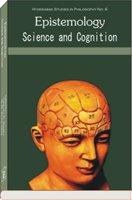Epistemology, Science and Cognition
Epistemology, Science and Cognition is backordered and will ship as soon as it is back in stock.
Couldn't load pickup availability
Genuine Products Guarantee
Genuine Products Guarantee
We guarantee 100% genuine products, and if proven otherwise, we will compensate you with 10 times the product's cost.
Delivery and Shipping
Delivery and Shipping
Products are generally ready for dispatch within 1 day and typically reach you in 3 to 5 days.
Here is the book detail formatted according to your preferred structure:
Book Detail
- Author: Basu, Prajit K.
- Brand: Decent Books
- Edition: 1
- Binding: Hardcover
- Number of Pages: 400
- Release Date: 30-01-2011
- EAN: 9788186921548
- Package Dimensions: 9.0 x 5.9 x 1.6 inches
- Languages: English
Description:
This volume brings together papers that delve into the phenomenon of cognition from an epistemological perspective, especially in the context of the linguistic and cognitivist shifts in philosophy. The recognition of psychology and cognitive science as integral to epistemology has led to an evaluation shift, where the focus is now on belief formation rather than knowledge claims. The volume explores questions such as the evaluation of psychological processes, the reliability of cognitive agents' methods, the reconfiguration of reason and rationality in line with new epistemological frameworks, and the implications of the cognitivist approach on scientific and day-to-day reasoning. It also addresses the limits of modeling and its role in science as a cognitive endeavor. These papers shed light on core epistemological concepts such as meaning, reference, truth, justification, and rationality, drawing from both Western and Indian traditions.
Author Details:
Prajit K. Basu is a prominent philosopher with a focus on epistemology, cognitive science, and philosophy of science. His work examines the relationship between cognitive processes and epistemic evaluations, particularly in the context of belief formation and rationality. Basu’s expertise lies in integrating linguistic and cognitivist shifts into traditional philosophical discourse, bridging the gap between cognitive psychology and epistemology.





